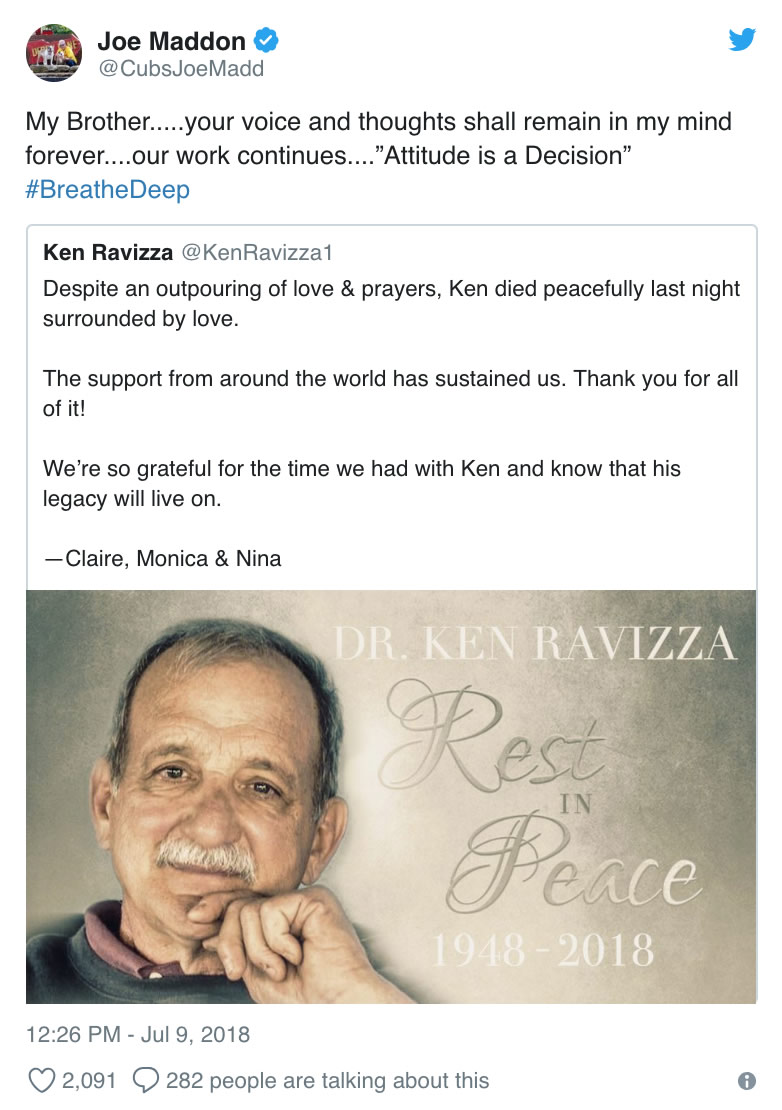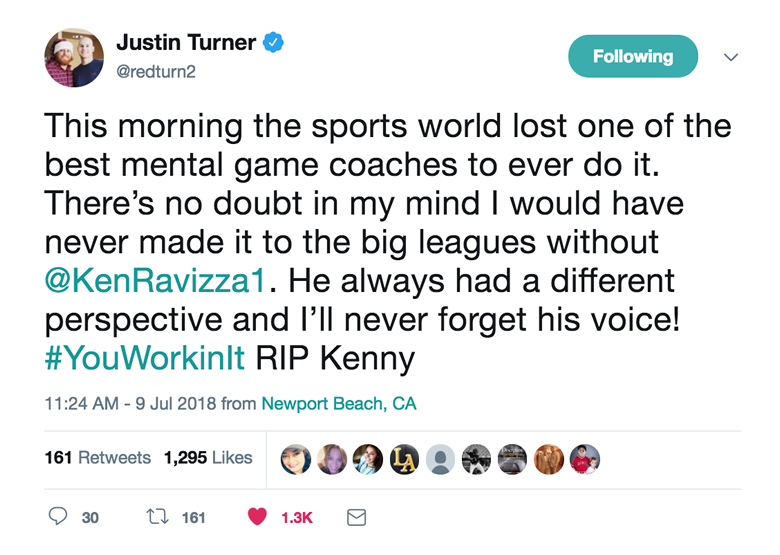As I pulled the weeds from the garden, I knew this was a perfect metaphor for all the mental game lessons I was being taught.
Weeds, like negative thoughts, will always resurface.
Make sure you have someone to help you weed them out.
I was lucky enough to have as my mentor, Ken Ravizza. Those years learning from him, being invited into his home and garden changed my life. Just as his book did months before.
I’ll never forget the day I found Heads-Up Baseball: Playing the Game One Pitch at a Time by Ken Ravizza.
July 4, 2000, I was a 21-year-old college baseball player rehabbing from a shoulder surgery, and I happened to be in Boston with some friends who needed something from Barnes & Noble. I went straight to the sports section and found Heads-Up Baseball.
I read the highlight boxes which spoke to me in a way that I had never heard coaches speak:
- Putting the process ahead of the outcome vs. being fixated on winning.
- Focusing on winning a pitch vs. winning a game vs. only caring if you won or lost.
- Controlling what you could control and letting go of what you couldn’t vs. focusing the majority of time on what you couldn’t control. (If you couldn’t control it, then time, energy and attention were wasted.)
- Breathing and self-control as a part of your mental and emotional management style vs. gritting your teeth and just going harder (aka Primal mode).
I immediately emailed Ken Ravizza at his Cal State Fullerton office, hoping to pursue a master’s degree in sport psychology while volunteering with the Titan Baseball program, since at that point in my life I wanted to be a baseball coach.
Ken replied to my email with a handwritten letter.
Three months later, I was on a plane to California, not realizing how much my life was about to change.
Walking into his office (also known as “The Bunker”) and seeing the books, videos, materials and memorabilia was like walking into a peak mental performance hall of fame.
I remember not sleeping that night because I was so enthralled with videos about the Blue Angels Navy Pilots, Skip Bertman’s book Winning the Big One and various other videos, books, articles and resources that would pave the way for how I live my life.
In the months and years that followed I spent a lot of time with Ken.
I remember going for walks with him at the ocean near his home in Redondo Beach, California. And I remember driving out to his house as a graduate student from 2001-2003 and picking weeds in the garden as he talked about the mental game.
I’d give anything for one more step or one more trip to the garden.
Ken’s life impacted thousands of people. From his students at Cal State Fullerton to the players he touched during his 30+ years in MLB Sport Psychology with the Angels, Dodgers, Rays and Cubs, he was truly a man built for others, someone who gave all he had all the time to his profession and to others.
On Sunday, July 8, 2018 – Ken passed away due to a heart attack.
The world lost the greatest mental performance coach. I lost my mentor and friend: the man who stood next to me as my best man at my wedding.
He was, without a doubt, the best man.
Though there is only one guarantee in life, and that is that none of us will be here forever, you can never fully prepare to lose a loved one. Losing Ken has been hard; there is no way to say it. It’s been one of the hardest losses I have ever experienced. And I know many others have been rocked by it as well:

He would want us to make it a “good shitty day” and to take time and reflect too. As he would like to say, “Take time to go inside and search for meaning.”
So, that’s what I did.
When I got news of his passing, I walked outside, sat in a chair and cried… for a while. I then decided that in times of stress and grief, movement is therapy. I hopped on my stationary bike, pulled out this computer and started typing.
I went back through many of my notes from my time with Ken. Time that was never enough in length or duration. Time that went by all too fast. Times that I would always say, Next time we will…
There will not be a next time. There is only this time. There is never a good time or a bad time unless you label it so. There is just time.
Time waits for nobody. Make time for what’s important to you. Don’t wait to drink your good wine, to write your book, to check in on your friend or to go visit your parents. Just do it… The other things that we often elevate to priority #1 – those urgent things like e-mail, traveling for work or meetings, etc. – can often wait.
While sitting on my bike, I rode for 70 miles and came out with 70 thoughts that Ken had shared with me that I want to pass on to you.
As one of his many former students, I have always seen it as my mission to help carry on his teachings and his influence by teaching others what he taught me.
I never thought that my life would align in such a way that I would get to do it on a full-time basis.
I have never had a “business plan” or a “career transition strategy.” I just go about my business teaching other people largely what Ken taught me in those two years of graduate school and in the 15 or so years of continual mentorship after I graduated.
Here is my list that I call the “KR70” – 70 ideas, one for every year of Ken’s life and one for every tear-driven mile of that bike ride. Movement is therapy; so is writing. I hope that you are able to take at least one idea from this list and apply it to your life.
THE KR70:
“70 LIFE LESSONS FROM MY MENTOR, KEN RAVIZZA”
- Look inside for the answers to life’s questions, not outside. (This message from one of Ken’s Philosophy of Sport classes and this overhead were the inspiration behind my first tattoo… the existential man, [below])
- Get comfortable with being uncomfortable.
- Control what you can control.
- You have to be in control of yourself before you can control your performance.
- You have very little control of what goes on around you, but total control of how you choose to respond to it.
- Be present, not perfect.
- Have a routine, and be able to compensate and adjust.
- Feeling good is overrated.
- Are you that bad that you have to feel good to play well?
- Mental Toughness is simply the ability to not let negative events, words, people, results, desires, etc., ruin your moment.
- Flush it and move on.
- Trust the Process.
- Attitude is a decision.
- Have a good shitty day.
- What are you going to do when you don’t have your “A” game? Give 100% of whatever you have to win the next pitch.
- What do you have to go to when the garbage hits the fan, because it will hit the fan.
- Inhale… Exhale.
- As the Greeks used to say, as an athlete, you stand naked before the gods fully exposed. There is nothing to hide.
- So what? Deal with it and move on.
- Recognize your signal lights and get back to the moment.
- It’s not, “I take a breath, I’m in the zone, I’m a champion.” It’s not that simple! It’s hard and complex; the mental game isn’t a magic pill.
- Simplexity – It can be simple and complex at the same time. It is what it is. You can label it as good, you can label it as bad, or you can label it as is. Be careful of how you label it.
- As an MLB pitcher, you get 30 starts per year. Five of those starts you are in “dial a pitch” and you’re going to win the game. Five of them you’re lucky to get out of the first inning… It’s the other 20 of those starts that will make your season.
- The 15 seconds between pitches: “That is where the mental game lives.”
- Sports is analog in the digital world. There is NOTHING quick here. You have to pay your dues. That’s why I respect athletes, because you have to have the courage to persevere! You have to learn your craft. You have to learn your skills. You can’t buy them.
- The pitcher has to beat you three times; you only need to beat him once.
- Slow the game down by slowing yourself and your breathing down.
- Work the process and learn every day.
- The time is now; the place is here.
- It begins before it begins.
- Don’t take the rubber till you are ready to take the rubber. When you step on the rubber, the last pitch is over and when your spikes hit rubber, the next one begins. Be where you need to be when you need to be there.
- Keep the process ahead of the outcome because you can’t control the outcome.
- It’s great to have passion, but you must direct that energy into your mission. Athletes must go beyond just working hard; they must work smart and work with a focus.
- Relax and breathe.
- You can’t personalize performance. What you do and who you are, though closely related, are not one and the same.
- There is no step up. The step up happens every day.
- Practice what you are going to do in a game. The mental game isn’t about stepping up in the big game; it’s about quality practice and making practice as game-like as possible so you are more prepared for the game.
- Failure is positive feedback.
- Keep quality greater than quantity.
- List the actions and techniques you think would help you if you did them before you go into the game so that when you go into a game you are trusting, not searching.
- Create an association between your mental game actions to your physical game actions.
- Adversity is the fertilizer of growth.
- Just be good – you don’t have to be great. You aren’t going to get in the zone. The zone is overrated.
- The mental game is just so messy; it’s not neat and concise. Our job as coaches is to help provide some structure and clear up the difficulties that go with it.
- “It’s not like the book, The Secret, where if you believe, you will achieve and everything works out. Reading that book is like going to Disneyland. It ain’t that simple. You have to push the rock and you have to do the work for as long as it takes.”
- The process is your armor against results and the fear of failure.
- High-level performers have a love-hate relationship with what they do.
- Why do we get upset as athletes and coaches? Because we care.
- Just remember you are doing the mental game whether you know it or not. It’s your system; put your touch on it.
- Tension is the body’s way of asking for attention.
- Baseball is a hard game and a great teacher of life.
- The more consistent your preparation, the more consistent your performance.
- Perfectionism is a double-edged sword; it’s a motivator and a constant critic that will zap you of your confidence if you aren’t careful.
- A routine is not a superstition or a ritual. It’s not magic. It’s a process that’s fundamental to creating consistency in performance.
- It’s one thing to have experience. It’s another thing to learn from your experience.
- You have to be able to get it done with your A game, your B game and your C game.
- We all need mental game reminders. Joe (Maddon) writes down mental game notes on his lineup card for every game because we need reminders. We have to advertise to ourselves the mindset that we want so we don’t forget.
- There is no magic. You are going to have to work your mental game every day and in practice. That goes for both coaches and athletes.
- The mental game is always changing. It undulates like biting into a chicken sandwich – no two bites, no two days, no two pitches are ever the same.
- There is no RESET button, there is no DO OVER button. You have to deal with adversity in life, this isn’t a video game where you just start over.
- What are you working on?
- Focus on function over feelings, what you need to do vs. how you feel about doing it.
- What you are aware of you can improve; what you are unaware of you can’t.
- If you decide to quit school, remember these six words, ’Do you want fries with that?’
- There it is… There is the adversity… Beautiful… breathe… beautiful.
- Get 100% out of the day you’re having.
- Do not permit the pressure to exceed the pleasure. Pressure is a privilege.
- Be where you need to be when you need to be there.
- It’s not right or wrong; it just is what it is. Accept it ‘cause it’s not going away.
- Like Sisyphus, you have to just keep pushing the rock moment to moment, day to day, pitch to pitch.
As I type these, I can hear Ken’s voice. I can feel his genuine compassion, honesty and caring for others as he taught and connected with the moment.
Ken’s life is a life to be celebrated. He left the world a better place and impacted so many lives it would be impossible to measure. Like a stone dropped into the middle of a lake whose ripples forever change the shore, Ken Ravizza’s life ripples through many of us in how we love, how we live, how we compete and how we proceed on our own paths trying to leave the world a better place.
Please comment below what you remember most about Ken, and please do your best to share the wisdom of this great man so that his teachings can continue to live on in you, in me and in others.
Sincerely,
Brian





